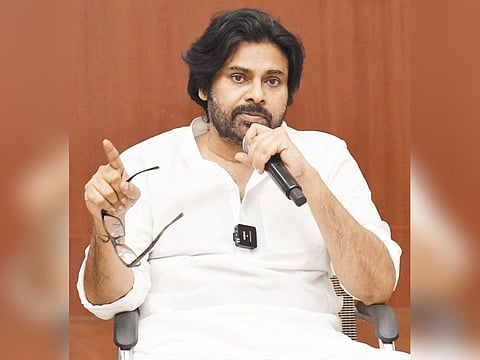

No political party can win elections without promising freebies. There's nothing wrong with the government providing free rice and food grains to the poor on ration cards, along with a house to live in. Everyone agrees that education and healthcare should be free. If these two services are accessible to all in the public sector, there would be no greater social security. However, political parties compete to win elections by promising unattainable free schemes. After coming to power, they either fail to implement those promises or take on lakhs of crores in debt to distribute public funds in the name of schemes. In the implementation of these schemes, the an ineligible benefit on one hand, while on the other, there are crores of rupees in corruption.
PK Tweet Sparks Debate over Freebies
This is why Andhra Deputy CM and Janasena chief Pawan Kalyan recently called for a "25-year future, not freebies." Pawan Kalyan's tweet on X (formerly Twitter), where he shared that youth only desire development, is not limited to Andhra Pradesh; it applies to the entire country.
"The thoughts and aspirations of the youth, which clearly emerged from my discussions with them, show that their profound determination is to build a sustainable future," commented Pawan Kalyan, sparking a debate on freebies. His view is that national development can only be achieved by effectively utilizing the talents of the youth.
Pawan Kalyan stated that the youth are not asking for freebies but a stable 25-year future. He said that in his discussions with the youth over some time, their thoughts and aspirations were clearly reflected. The youth want to build a sustainable future through their own hard work rather than relying on free schemes. He clearly remembers those conversations, and their words have left an indelible mark on him. He said they did not ask for any freebies or demand welfare schemes. Instead, they said firmly, "We don't want freebies; give us a future for the next 25 years."
Pawan Kalyan believes that the youth possess immense potential and talent, and effectively utilizing this potential is the key to national development.
Freebies or Future?
Political leaders and intellectuals believe that freebies permanently harm society. It's not that the heads of political parties don't know this; they make promises of free schemes out of compulsion. It seems to them like the shortest path to power. However, many hope that Pawan Kalyan's comments will open the eyes of other leaders.
Contentious Issue in Politics!
The debate around freebies has been a contentious issue in Indian politics for a long time. While they are often seen as a quick way to garner votes, their long-term economic and social impacts are a matter of serious concern for economists and policymakers.
The economic repercussions of freebies can be severe, leading to fiscal stress and debt. For example, a study by the Reserve Bank of India (RBI) in 2022 highlighted that the debt-to-GSDP (Gross State Domestic Product) ratio of several Indian states had crossed the 30% mark, largely due to populist freebie schemes. The study pointed out that these schemes, while providing short-term relief, often undermine fiscal discipline and can crowd out essential capital expenditure on infrastructure, healthcare, and education.
A prominent example is Sri Lanka's economic crisis in 2022, which many experts attribute partly to unsustainable populist policies, including tax cuts and freebies, leading to a massive debt spiral. This serves as a cautionary tale for states that heavily rely on such schemes.
Revdi Culture – Very Dangerous
The call against freebies is not new. Several prominent figures have voiced their concerns over the years.
In 2022, PM Narendra Modi referred to the politics of freebies as "revdi culture" (a metaphor for sweets given away for free), stating that it is "very dangerous" for the country's development. He emphasized that this culture can lead to short-term political gains at the cost of long-term national growth. As the former Prime Minister and a renowned economist, Dr. Manmohan Singh has also cautioned against the excessive use of freebies, arguing that they can create an unhealthy fiscal situation.
N. R. Narayana Murthy, the co-founder of Infosys has on several occasions stressed the importance of creating jobs and wealth through innovation and hard work, rather than relying on handouts. He has consistently argued that a nation's progress is built on the shoulders of its youth's talent and entrepreneurship, not on freebies.
Youth Perspective On the Country’s Future
Pawan Kalyan's comments resonate with a growing sentiment among India's youth. Surveys and discussions indicate that a significant portion of young voters are more concerned with employment opportunities, quality education, and better infrastructure than with short-term freebies. They understand that a stable job and a promising career are far more valuable than a few hundred rupees or a temporary gift.
The phrase "25-year future" is a powerful one, as it highlights a demand for long-term vision from political leaders. It suggests that the youth want policies that invest in human capital, technology, and sustainable growth, which will create a foundation for a prosperous future for themselves and the country. This perspective challenges the traditional political narrative and puts pressure on parties to move from populist promises to performance-based governance.
This shift in focus from immediate handouts to long-term development is crucial for India's growth trajectory. By channeling public funds into strategic investments rather than unsustainable freebies, the government can build a stronger, more resilient economy that provides real opportunities for its citizens.
